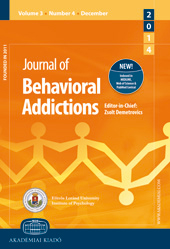Adaptation and Psychometric Evaluation of the Young Diagnostic Questionnaire (YDQ) for Parental Assessment of Adolescent Problematic Internet Use
Adaptation and Psychometric Evaluation of the Young Diagnostic Questionnaire (YDQ) for Parental Assessment of Adolescent Problematic Internet Use
Author(s): Lutz Wartberg, Levente Kriston, Katharina Kegel, Rainer ThomasiusSubject(s): Psychology of Self, Psychoanalysis, Evaluation research, Substance abuse and addiction, Social Informatics
Published by: Akadémiai Kiadó
Keywords: problematic Internet use; Internet gaming disorder; questionnaire; validation; adolescent; parent;
Summary/Abstract: The surge of problematic Internet use in adolescents is a continuously growing problem across the globe. To our knowledge, to date valid questionnaire-based measurement of problematic Internet use is possible only by self-assessment. The objective for the present study was to adapt an established instrument for a parental assessment of adolescent problematic Internet use and to evaluate the psychometric properties of this questionnaire. Methods: Data were collected from a representative German sample of 1,000 parents of adolescents aged between 12 and 17 years using a standardized questionnaire. To assess problematic Internet use, we adapted the established Young Diagnostic Questionnaire by rewording the items to survey a parental rating instead of a self-report (“Parental version of the Young Diagnostic Questionnaire,” PYDQ). Additionally, we assessed the Internet usage time, parental monitoring, family functioning, school performance of the adolescent, and parent–adolescent conflicts. We conducted a confirmatory factor analysis based on the 8 items of the PYDQ modeled as categorical indicators and one latent factor using a robust weighted least squares estimator. We also calculated a reliability coefficient, the acceptance of the instrument, and performed correlation analyses. Results: The unidimensional model showed excellent global goodness-of-fit (χ2/df = 1.65, RMSEA = 0.03, CFI = 0.99, TLI = 0.99) and satisfactory factor loadings (standardized values ranged from 0.60 to 0.77). We observed a reliability coefficient of 0.70, a good acceptance of the instrument, and the correlation analyses indicated the construct validity of the PYDQ. Discussion and conclusion: The proposed PYDQ is a suitable instrument for parental assessment of adolescent problematic Internet use.
Journal: Journal of Behavioral Addictions
- Issue Year: 5/2016
- Issue No: 2
- Page Range: 311-317
- Page Count: 7
- Language: English

